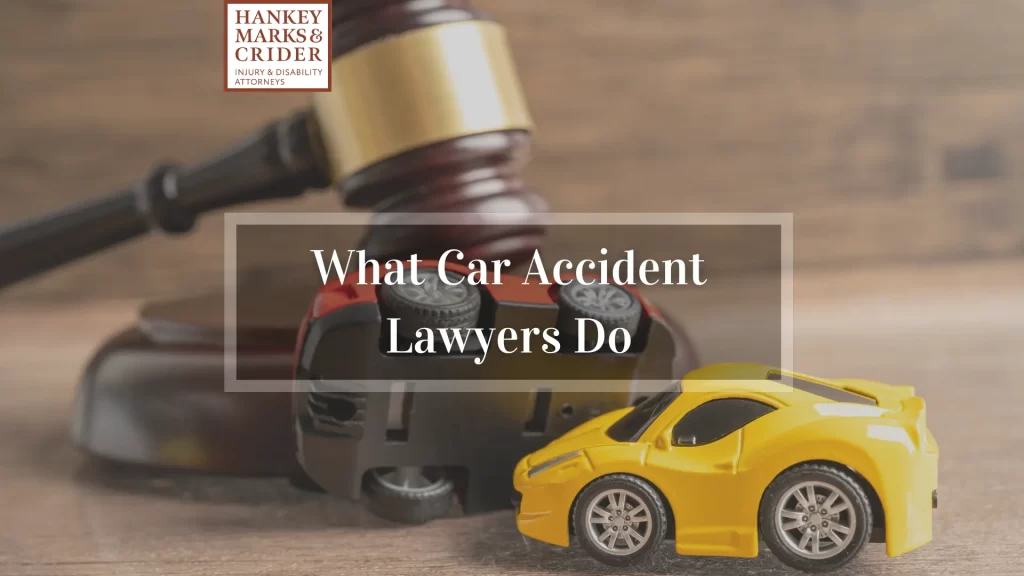
When you’re injured in a crash in Indianapolis that someone else caused, your first reaction might be anger. Then, as you work on healing your injuries and the bills start coming in, you may worry: how will all those bills get paid?
A car accident attorney can help you get the money you need after you’ve been hurt in an Indiana car wreck due to another’s wrongdoing. However, you may have some questions about hiring a lawyer. Specifically, you might wonder what car accident lawyers do for their clients.
Deciding Whether You Need a Lawyer
You may not know whether you even need an attorney’s help after a collision. Questions to ask yourself when considering this matter include:
- How serious are my injuries?
- Have I already received a settlement offer from an insurance company? Is it fair? Would I know if it wasn’t?
- Do I believe someone else caused my crash through negligence?
- Was the other driver uninsured?
- Does the other driver’s insurance have sufficient policy limits to cover my accident-related losses?
Remember that we don’t charge for initial consultations at our Indiana car accident law firm. You’re not risking any money by meeting with our lawyers to discuss your case.
During our first meeting, we’ll gladly answer your questions about what car accident lawyers do. The information we provide can help you decide whether hiring a lawyer is the right decision.
Steps in a Car Accident Case
Every car accident case is unique. They may not all involve the same steps in the same order. However, pursuing compensation after an Indiana car wreck might involve:
- Filing a police report — It’s always wise to call the police after a collision. The Indiana Driver’s Manual states that notifying law enforcement immediately after a crash resulting in injury, death, or property damage is every driver’s legal responsibility.
- Seeing a doctor — See a doctor immediately after the police permit you to leave the accident scene. Doing so is vital regardless of whether you notice any injury symptoms.
- Determining liability — Indiana is an at-fault or “tort” state. In an at-fault state, the party who caused an accident should be responsible for compensating injured parties. You may need to investigate your accident to determine who caused it.
- Gathering evidence — The at-fault party’s insurer may deny your claim if you don’t provide evidence proving their policyholder was negligent. Collecting such evidence may require interviewing witnesses, gathering photos, reviewing police reports, etc.
- Submitting a claim — You may submit your insurance claim once you’ve gathered evidence and estimated your claim’s potential value.
- Negotiating — The insurance company might not offer the settlement you deserve when you initially file a claim. You may have to fight for a fair settlement if an insurer tries to lowball you.
If you’re injured, you shouldn’t have to deal with all those tasks yourself. An Indiana car accident lawyer can handle all but the first two of them for you. If you already have an offer, your lawyer can help evaluate it to determine whether pursuing damages in court is necessary. An attorney might even help you find doctors who will wait until after you receive a settlement to accept payment.
Compensation in Car Accident Cases
The Insurance Information Institute reports the average motor vehicle collision claim amount was $3,574 in 2018. That does not necessarily mean you will receive similar compensation. Various factors can affect the value of your case, including:
- Your medical bills
- Your lost wages
- The severity of your injuries
- The duration of your recovery
- Whether you were partially responsible for the collision
You can break down potential compensation in car accident cases into two categories:
- Economic damages, which are compensation for the specific financial losses resulting from your crash (such as medical bills and other expenses)
- Non-economic damages, which are compensation for intangible losses, such as pain and suffering or loss of enjoyment of life
Assigning a dollar value to non-economic losses like emotional or physical pain is a complex process. A lawyer can manage this task. It’s important to understand that a lawyer can’t guarantee you will receive a specific amount of money. What we can do is fight for an appropriate settlement if an insurer’s first offer is too low.
Cost of Hiring a Personal Injury Lawyer
 You might worry you can’t afford to hire an attorney. While facing medical bills, you may not want to add to your financial burdens. Hiring an attorney to represent you may cost less than you realize. At Hankey Marks & Crider, we don’t charge our clients any upfront fees when we first accept a case. Instead, we enter into contingency fee agreements with our clients.
You might worry you can’t afford to hire an attorney. While facing medical bills, you may not want to add to your financial burdens. Hiring an attorney to represent you may cost less than you realize. At Hankey Marks & Crider, we don’t charge our clients any upfront fees when we first accept a case. Instead, we enter into contingency fee agreements with our clients.
A contingency fee agreement allows someone to hire a car accident attorney without taking a financial risk. When you enter such an agreement, your lawyer will only charge attorney fees if they successfully resolve your case. In other words, you don’t pay us any attorney fees unless you get paid first. Your legal fees will be an agreed-upon percentage of the compensation you receive.
Be aware that attorney fees don’t include additional expenses. We encourage you to review an attorney’s contract to understand what expenses you might incur as your case moves forward.
For instance, some firms will charge for relatively minor expenses such as postage or office supplies. Such costs may add up as a case progresses. You could be on the hook for these fees even if your lawyer doesn’t win your case.
Our firm’s additional expenses only include medical records. In addition, we only require repayment of these expenses if we win your case. However, other firms may tack on more expenses. Remember this before signing a contract.
Find Out What Car Accident Lawyers Do in Indiana
One of the best ways to find out what an Indiana car accident attorney may do for you is to review your case with one. At Hankey Marks & Crider, we’ll discuss your case in specific detail during your free consultation. Schedule your case review today by contacting us online or giving us a call at (317) 634-8565.
Related Reading:

